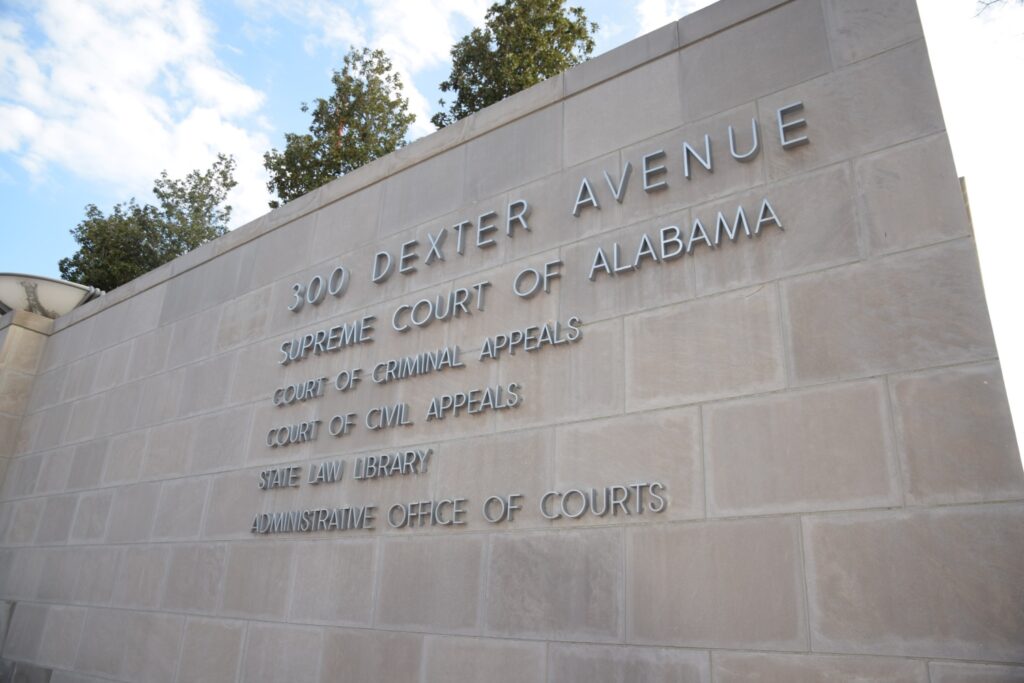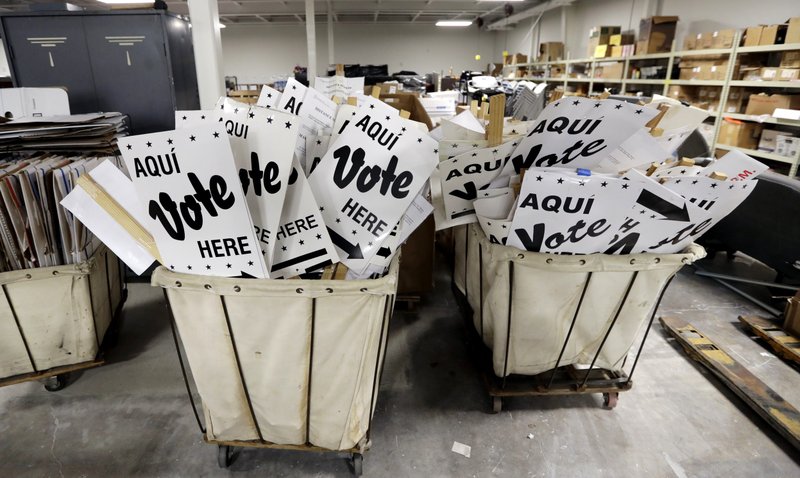Most Republican appellate court incumbents win without an opponent as Democrats concede state appellate courts to the GOP

Major party qualifying ended on Friday. Four Republican Alabama Supreme Court Justices won election when no opponent – Republican or Democrat came forward. Justices Will Sellers, Tommy Bryan, and Jay Mitchell were all effectively re-elected as they face no Republican primary challenger. Write-in candidates are not allowed in party primaries. No attorney qualified for any of these races as a Democrat, so they are unlikely to face an opponent in the November general election. Chris McCool gave up his seat on the Court of Criminal Appeals to run for the open Place 1 associate supreme court justice seat. He also had no Republican or Democratic opponent qualify. On the Alabama Court of Criminal Appeals, Republican incumbent Judges Richard Minor and Bill Cole were both effectively re-elected when no Republican or Democratic opponent qualified for either race. Two Republicans: Rich Anderson and Thomas Govan, qualified for the open Place 2 seat that Chris McCool is leaving to run for Supreme Court. Both Govan and Anderson work in the Alabama Attorney General’s office. No Democrat qualified for that seat either, so Govan and Anderson’s race in the Republican primary on March 5 is likely to decide this race. On the Alabama Court of Civil Appeals incumbents Christy Edwards and Terry Moore were both effectively re-elected when qualifying ended without either facing any opposition. The only incumbent appellate judge in the state to face a challenger is Republican: Republican Chad Hanson at Place 2 on the Court of Civil Appeals is being challenged in the Republican primary by Stephen Davis-Parker. There are four candidates running for Chief Justice of the Alabama Supreme Court. Chief Justice Tom Parker, also a Republican, cannot run again due to the state’s arcane mandatory retirement age for judges provision. Associate Justice Sarah Stewart is giving up her place 1 seat on the court to run for Chief Justice. Former State Senator Bryan Taylor is also running for the office. Taylor is also a former legal counsel for Governors Kay Ivey and Bob Riley. On Friday, Montgomery attorney Jerry Michael Blevins also qualified to run for Chief Justice. Chief Justice is the only state appellate race that the Alabama Democratic Party is even contesting. Judge Greg Griffin will face the eventual Republican nominee for Chief Justice in the November general election. Griffin presently is a Circuit Court Judge in Montgomery’s Fifteenth Judicial Circuit Court. Thirty years ago, Democrats dominated the Alabama appellate courts. That changed in 1994 when retired Judge Perry Hooper Sr. defeated incumbent Sonny Hornsby in a contested race for chief justice. In the years since, Republican fortunes have continued to improve. Only one Democratic candidate, Doug Jones in 2017, has won any statewide race since 2008, and no Democratic judicial candidate has won a statewide race since Sue Bell Cobb was elected Chief Justice in 2006. Democrats are hopeful that Judge Griffin can change their fortunes next year. There is still a slight possibility that an attorney could still qualify as an independent or third-party candidate for one of these offices. To connect with the author of this story or to comment, email brandonmreporter@gmail.com
Young Republicans gather in Moody

On Saturday, Young Republicans (YRs) from across the state gathered at Moody Park for an afternoon of barbecue, bluegrass music, and camaraderie as the St. Clair County Young Republicans (YRs) held their summer gathering. St. Clair County Young Republicans Chairman Logan Glass presented plaques to Federation of Alabama State Young Republican President Stephanie Petelos and State Representative Craig Lipscomb (R-Gadsden) – who represents parts of St. Clair and Etowah counties. Glass praised Petelos for her example and her leadership and credited her with restoring the Greater Birmingham Young Republicans (GBYRs) to its role as the largest Young Republican group in the state. That club has grown to the point that a new club has branched off from the GBYRs – the Shelby County Young Republicans. Glass thanked Lipscomb for his work in Montgomery on behalf of the county and for his support of the YRs. The St. Clair Young Republicans presented former St. Clair County Republican Party Chairman Circuit Judge Phil Seay with the inaugural Phil Seay Award. Seay is the President of the Alabama Judges Association. Glass thanked Seay for his years of unwavering support for the YRs. Former State Representative Mike Ball and his bluegrass band performed at the event. Ball served twenty years in the Alabama Legislature representing Madison. He is the author of an autobiographical book about his experiences: Picking, Politicking and Pontificating: How an Ex-Cop Legalized Cannabis While Fighting Corruption. Several state appellate court seats are on the ballot in 2024, so several judicial candidates were present at Saturday’s event. Former State Senator Bryan Taylor (R-Prattville) was present. Taylor is running for Chief Justice of the Alabama Supreme Court. Current Chief Justice Tom Parker is near the age 70s age limit, so he is prevented from running again. Taylor is a practicing attorney who has held many state government positions, including counsel for Governor Kay Ivey. Taylor is a retired Judge Advocate, a former military prosecutor, and an Iraq War veteran. Taylor faces a Republican primary battle with Alabama Supreme Court Justice Sara Stewart. Current Court of Criminal Appeals Judge Chris McCool is running for the position on the Alabama Supreme Court that Stewart is vacating in her run for Chief Justice. McCool is a former district attorney in West Alabama. McCool is also a farmer, a preacher, and a gospel singer. He performed a couple of songs with Ball and his band at Saturday’s event. James Govan is running for the position on the Alabama Court of Criminal Appeals that Judge McCool is vacating. Govan is a career prosecutor and a U.S. Air Force Reserve officer currently working for the Alabama Attorney General’s office. Rich Anderson is also an Assistant Alabama Attorney General and a prosecutor running for the Alabama Criminal Court of Appeals. Anderson has represented the state of Alabama before the Criminal Court of Appeals, federal district courts, the Alabama Supreme Court, the Eleventh Circuit Court of Appeals, and the U.S. Supreme Court. Emory Cox was the platinum sponsor of Saturday’s event. Cox is U.S. Senator Tommy Tuberville’s aide on finance and economics. While Cox’s duties in Washington D.C. prevented him from attending, Cox’s mother, Annette Cox, the owner of St. Clair County-based Metro Bank, was present. Glass thanked the Cox family for their friendship and history of support for the YRs and Emory for his service in Washington. Bamacarry of St. Clair County was an exhibitor and a sponsor of Saturday’s event. Glass also thanked Shaw’s Barbecue for the food as well as all of the many bronze sponsors of the event. Other notables in attendance were State Supreme Court Justice Greg Cook, State Rep. Jim Hill (R-Odenville), State Senator Lance Bell (R-Pell City), Court of Criminal Appeals Judge Bill Cole (R), Alabama Court of Civil Appeals Judge Matt Fridy, St. Clair County District Attorney Lyle Harmon, St. Clair County Commissioner Tommy Bowers, commission candidate James McGowan, former St. Clair County Republican Party Chairman Joey Stephens, St. Clair County School Board Member Bill Morris, and Colbert County Assistant DA Brent Woodall. To connect with the author of this story or to comment, email brandonmreporter@gmail.com.
Five days until runoff election, final day for absentee ballot: get voting information here

With the Alabama runoff election only five days away voters in the Yellowhammer State need to know where to vote, and who’s on their ballot. Absentee ballots are available for those who cannot be physically present to vote, but today, July 12 is the last day to complete an application. According to the Secretary of State’s office here’s how to apply for an absentee ballot: To obtain an absentee ballot, write or visit the local Absentee Election Manager (usually the Circuit Clerk), request an absentee ballot, and provide the following: name and residential address (or other such information in order to verify voter registration) election for which the ballot is requested reason for absence from polls on election day party choice, if the election is a party primary. (It is not necessary to give a party choice for a general election; however, in a party primary a voter may participate in only one political party’s primary; thus a choice must be designated so that the appropriate ballot can be provided. If the voter declines or fails to designate a choice for a primary or primary runoff ballot, the absentee election manager may send only the ballot for constitutional amendments.) address to which the ballot should be mailed voter signature (If a mark is made in place of a signature, it must be witnessed) The absentee ballot application must be returned to the Absentee Election Manager by the voter in person (or by the voter’s designee in the case of medical emergency voting) or by U.S. Mail. No absentee ballot application may be mailed in the same envelope as another voter’s absentee ballot application. Here are the links to the statewide runoff candidate’s campaign websites: Lieutenant Governor’s race: Will Ainsworth Twinkle Andress Cavanaugh Attorney General’s race: Troy King Steve Marshall Commission of Agriculture and Industries race: Gerald Dial Rick Pate Supreme Court place 1 race: Brad Mendheim Sarah Stewart Civil Appeals Court, place 1 race: Christy Edwards Michelle Thomason Criminal Appeals Court, place 2 race: Rich Anderson Chris McCool Sample Ballots: Jefferson County – Republican: Jefferson County – Democratic: Madison County – Republican: Madison County – Democratic: Mobile County – Republican: Montgomery County – Republican: Montgomery County – Democratic:
Here’s how much statewide runoff candidates have raised, spent since the primary

The July 17 runoff elections less than a week away. Campaign finance reports have been filed weekly with the Secretary of State’s office since the June 5 primary. Looking a them now serves as a good marker of how much support candidates are receiving, and how much money they’re spending on their campaigns in hopes of cinching their party’s nomination. Recap of the month Statewide runoff races have taken a negative turn with Lt. Governor candidates Will Ainsworth and Twinkle Andress Cavanaugh firing shots back and forth at one another via television ads. Restarting their campaigns following the tragic death of Steve Marshall‘s wife Bridgette Genery Marshall, Marshall’s opponent Troy King vowed to keep on message of his political record and qualifications going forward. However, on Monday he filed a complaint against Marshall with the Alabama Ethics Commission, accusing Marshall and his staff of accepting PAC-to-PAC money despite the state’s ban. Even the race for Alabama Commissioner of Agriculture and Industries took a dark turn earlier this week after Gerald Dial released a campaign ad dredging up a 32 year old divorce document between his opponent Rick Pate and his ex-wife, Carolyn Pate. A look at the numbers Note: All numbers come from weekly campaign finance reports filed from period June 1 to July 6 Lieutenant Governor’s Race: Will Ainsworth Raised: $93,425 Spent: $568,543.94 Twinkle Andress Cavanaugh Raised: $513,300.57 Spent: $658,060.05 Attorney General’s Race: Troy King Raised: $421,610 Spent: $422,598.28 Steve Marshall Raised: $515,344.60 Spent: $263,341.06 Commission of Agriculture and Industries race: Gerald Dial Raised: $58,240 Spent: $209,533.40 Rick Pate: Raised: $97,100 [35,000 in receipts from sources other than cash] Spent: $152,766.52 Supreme Court place 1 race: Brad Mendheim: Raised: $178,050 Spent: $183,521.10 Sarah Stewart Raised: $11,000 Spent: $263,179.52 Civil Appeals Court, place 1 race: Christy Edwards Raised: $120,500 [Receipts from other sources $1,200] Spent: $129,110.69 Michelle Thomason Raised: $23,525 [$51,124.96 in receipts from other sources] Spent: $86,965.83 Criminal Appeals Court, place 2 Rich Anderson Raised: $7,600 Spent: $19,105.23 Chris McCool Raised: $87,000 [$1,448.86 in receipts from other sources] Spent: $107,820.36
Five things you need to know about Chris McCool

The primary elections are over, but some highly sought spots still remain open due to the primary races resulting in runoffs. One of those races is for the Alabama Court of Criminal Appeals Place 2. Three candidates stepped up to the plate seeking election in the June 5 primary. Both Chris McCool and Rich Anderson garnered enough support to tip the race into a a runoff election set for July 17. With that in mind, here are the five things you need to know about Chris McCool: 1. Has served on the Executive Committee of the Alabama District Attorneys Association (ADAA) for 10 years. During that time he’s served in multiple roles: as President, Vice President, and Treasurer. 2. He’s won a lot of awards for the work he’s done. In 2007, he was named “Prosecutor of the Year” by VOCAL (Victims of Crime and Leniency) and “District Attorney of the Year” by the ADAA. He was also named “Prosecutor of the Year” by the Alabama Forest Owners Association in 2012. 3. He’s worked as an adjunct professor. McCool was an adjunct professor in the Trial Advocacy Program at the University of Alabama, School of Law from 1998 to 2000. 4. He knows a thing or two about farming. He lives on, and manages, the farm that has been in his family for five generations. 5. Roll Tide Roll (need we say any more?). McCool graduated from the University of Alabama in 1990, with a bachelor’s degree in History and Classics, and the University of Alabama, School of Law in 1993.
Five things you need to know about Rich Anderson

The primary elections are over, but some highly sought spots still remain open due to the primary races resulting in runoffs. One of those races is for the Alabama Court of Criminal Appeals Place 2. Three candidates stepped up to the plate seeking election in the June 5 primary. Both Rich Anderson and Chris McCool garnered enough support to tip the race into a a runoff election set for July 17. With that in mind, here are the five things you need to know about Rich Anderson: 1. He began his career in Alabama’s Supreme Court. After attending Washington & Lee School of Law in Virginia, Rich began his legal career as a clerk for Justice Gorman Houston on Alabama’s Supreme Court. He’s been an attorney for over seventeen years, 2. He’s worked in the Alabama Attorney General’s office. Anderson has been an appellate prosecutor in the Capital Litigation Division of the Alabama Attorney General’s office for over a decade. During his career with the Attorney General’s office, Rich has represented the State in dozens of death penalty cases. Death penalty litigation involves the most complex and serious issues that come before the Court of Criminal Appeals. Every day, Rich proudly fights to get justice for crime victims at every level of the appellate system. 3. Being a judge is a family tradition. Anderson is son of former Circuit Judge Mark Anderson and Jean Anderson, herself the daughter of long-time Sumter County Judge of Probate Wilbur Dearman. 4. He’s a member of a non-profit board. For several years Anderson has been a member of the Friends of Academics and Magnets in Education (FAME) Board, a 501(c)(3) nonprofit that supports local public education efforts in the fdr 5. He’s a card-carrying member of the Federalist Society and the NRA. “On the back of my Federalist Society membership card is a quote from The Federalist paper No. 78 that pretty much sums up my judicial philosophy: ‘The courts must declare the sense of the law, and if they should be disposed to exercise WILL instead of JUDGEMENT, the consequence would be the substitution of their pleasure for that of the legislative body.’ As a prosecutor, I have always sought to be an advocate for justice without exceeding the bounds of the law. As a Judge, I promise that I will decide every case on its merits and on what the law requires.”


